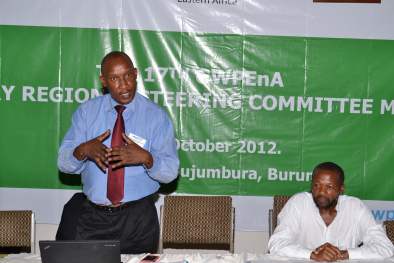The delegates had gathered for the Regional Steering Committee Meeting held on 22nd -23 October 2012 in Burundi’s Capital, Bujumbura.
Prof Munguti from Kenya Water Partnership was voted to steer the meeting attended by representatives from Country Water Partnerships from 8 countries—Kenya, Rwanda, Burundi, Sudan, Uganda, Egypt and Ethiopia.
Referring to the general approval of GWPEnA’s renewed pace to deliver to the expectations of different stakeholders, Prof Munguti added “there is a renewed momentum towards achieving GWP Vision. All CWPs’ activities need to be more aligned to the general philosophy of GWP Forum as clearly imbedded in its vision and four strategic goals.”
The meeting reviewed 2012 action plans, challenges encountered and devised strategies to effectively fast-track the implementation of the 2013 planned activities. The RSC ended with approval of Action Plan for 2013 and other key operational and administrative tools and strategies to streamline GWPEnA activities.
The discussions in the RSC meeting mainly centered on the 2012 registered achievements, work plans and key strategic directions for 2013, sharing of best practices amongst CWPs and generating inputs on several operational tools and strategies aimed at strengthening the GWP Eastern African Secretariat and Country Water Partnerships.
Mr. Evariste Sinarinzi from Burundi Country Water Partnership who also served as the representative of the Burundi Ministry of Water and Environment welcomed the meeting as “timely and reflective of Burundi’s continued commitment to further improve water resource planning and management.”
He further urged delegates that all deliberations, decisions and commitments characterizing the meeting should be geared towards “serving and responding to citizens’ water needs in our respective countries.”
The Regional Coordinator of GWPEnA, Mr. Safari Patrick acknowledged the warm and healthy cooperation between the Global Water Partnership, Regional Secretariat and the Steering Committee Members. “GWPEnA is now better positioned to deliver to the expectations of GWPO, and further deepen cooperation with partners and stakeholders across the region,” Safari noted.
He urged CWPs to be more proactive especially in sharing knowledge in areas of the integrated Water Resource Management (IWRM), Resilience to Climate Change, Water-Food Security nexus and influencing and advocating for water-wise policies and plans in their respective countries.
Safari stressed that through concerted efforts, challenges pertaining to food insecurity, environmental degradation and limited climate change adaptation mechanisms still facing the Eastern and Greater of African Region can be transformed into future opportunities and strengths. To foster an integrative approach in addressing the above challenges, GWP Eastern African has 8 CWPs and 165 partners actively involved in domesticating IWRM, influencing and advocating for water-wise policies and plans at country levels.

